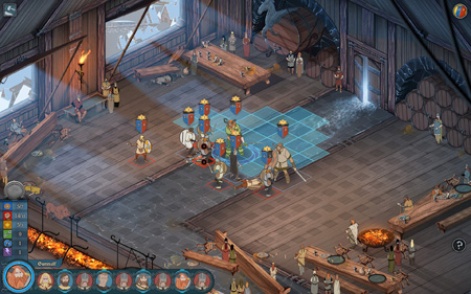The concept of our Mavens discussion groups is simple.
We bring together a group of industry experts and get them to discuss, debate and perhaps even argue the tough topics of the mobile games industry.
In order to keep our groups flexible and dynamic, we're constantly looking to launch new Mavens; something which has seen the rise of our Monetisation Mavens alongside our original Mavens group.
And now we're giving indie developers their own space with the launch of our Indie Mavens.
The intention is to gain insight into the issues of creating and releasing games as a solo developer or small company, and the many challenges that are specific to that situation.
To get us started, we were interested in finding out about the current state of multi-platform development?
In the past, there have been plenty of issues regarding the accessibility of tools for multi-platform development; something that has perhaps solved by the rise of thirdparty engines. More recently, though, we've seen the rise of player power, with the assumption that all games will be able on all platforms.
So, with that in mind, we asked our indie game developers:
Given the wide array of cross-platform development tools, and the demands of players, have we moved from a mobile-only to a mobile-first culture?
This question can be interpreted in many ways.
Business decisions affect which platform a game is first launched on.Simon Smith
Cross-platform dev tools don't really affect which platform the game is first launched on. They do affect which platforms a game is released on at all. For example the previous lack of HTML5 support in Unity has limited the amount of games release on mobile + HTML5.
Business decisions affect which platform a game is first launched on.
If Apple/Amazon/Google give me a better position in their store if I launch there or make my game exclusive then I'm likely to go with them. Maybe I'd prefer to launch on PlayStation Network because of the vast amount of help I can get from Sony. It's impossible to say one is always going to launch a game first on mobile when there are so many factors involved.

Jon's focus is on content, working from the initial outline, through the development of the authoring tools, to the writing and scripting of final content.
Previously, Jon was a lead designer at Sony Computer Entertainment Europe, and before that a secondary school teacher, so he loves to talk. He's a published author of short stories and over a decade's worth of award-winning interactive fiction.
I seems to me the trend is towards Banner Saga-style, Steam-first, mobile-later, since Steam gathers so much more publicity (and such higher prices).
But for explicitly mobile developers like ourselves, cross-platform tech is certainly helping to tip the balance.

It's almost always a good idea to port a strong game, since coming up with a new, good, game is way harder than porting an already-successful title.
Good tech solutions make that easier. But it's never going to be a given.
All consumers want the hot game on their device. They resent having to buy a new device just to get that game. Platform exclusives are becoming increasingly old fashioned, look at the outcry over Microsoft 'buying' the Tomb Raider exclusivity.
So, as developers, the more we use cross-platform tech the more copies we get out there and the more people buy our games. This is nothing new. We just have a nice new set of cross-platform tech like Unity that have come along.
I have been doing mobile-first ever since 2008. Which is ironic, because my platform (Nintendo DS/3DS) is probably the only platform by now that does not use cross-platform tools.
Even Nintendo WiiU has Unity and the web framework.
I don’t go mobile because it’s easy, I go mobile simply because I can earn the most there (at least for my games, the biggest part of my target group is on 3DS).
I think the common place of tools like Unity has meant the hurdles to moving games around are lower than ever so it's tempting to spend the time porting a successful game to other platforms.
Which is great from a business stand point as it's more places to make money but creatively it's a bit of drain being stuck on the same game for years chasing every avenue of money for it.
Probably mobile-last is still a win-win strategy.Pavel Ahafonau
Hard to say mobile-first.
Probably mobile-last is still a win-win strategy.
I don't see many titles that became popular on PC/whatever platform after a good launch on mobile - while at the same time many PC/whatever platform titles done launch nicely on mobile, sometimes a year later.
In my world, I only port a mobile game to PC if it will play well on PC with mouse and keyboard, and not with touchscreen-only. I also do it If it got some good attention on mobile, so having it on PC afterwards will help me to get some money to cover my expenses.
Even before having cross-platform tools I would do the same but having these tools makes that decision easier for me.
Also, without these tools, I would never start mobile development because I have only a Windows PC (no Mac). Nor can I afford a Mac, and because of Adobe Air and its power to wrap an IPA over Windows I have been able to develop lots of mobile titles.
By the way, some ideas I had are PC-only and when I develop them I won't consider them for mobile because if they are ported they will need a controller, which means "virtual keys" and it's a thing I hate a lot.
I think tools have just helped developers to go from one platform to another based on some business decisions, but at same time it didn't change the idea.
If the game is only for a specific platform because it suits it best then I won't port it to another (I do that until now may be change in future also based on business designs (moneywise)).
It makes sense to not go for platform exclusives anymore, instead making your game run on everything. PC-first, but having it be cross-platform to mobile seems like the best way to do it.

PC/console ports are still seen as "more valuable" by mobile gamers than games made originally for a mobile platform - $15 BioShock, $10 XCom, $7 Minecraft (launched back when $3 was more or less the max premium price). 7
Maybe the best example of this is FTL.
It runs so well on mobile that you could easily imagine it being launched on mobile first. But if it did, I believe that it wouldn't have gained nearly as much publicity. I also think as a mobile-first game, it would have commanded a lower price due to a lower perceived value. It's really weird how that works.
I would argue that we're heading from a mobile-only towards a mobile-last culture. A lot of indies are finding better success launching on PC and other platforms first, before returning to mobile with some publicity and recognition under their belt.
On PC, it's much easier to build a fan base that you can use later to promote a mobile version of the game.David Mitchell
There are a lot of challenges on mobile, and many of them still translate to PC and other platforms, but one of the biggest is building a community and a fan base. That's extremely difficult on mobile due to the nature of the demographic and closed nature of the app stores. On PC, relatively, it's much easier to build a fan base that you can then use later promote a mobile version of the game.
Evidently, I haven't really mentioned anything about cross-platform development tools yet, which in part is an indication of how things have changed. Because in many ways these tools considerably lower the technical barriers so that the main decisions and focus can be around what platform is best from a business and design perspective, rather than worrying about technical limitations.
One other thing that's worth a mention is device fragmentation. Designing and building a game for mobile is still a lot of extra work to support the multitude of screen sizes and older devices with slower CPU/RAM etc, even when you use these cross-platform tools.
Generally speaking things are much simpler on the PC side, and this can save a lot of time for an Indie.
Yeah, I'm with Kepa and David on feeling like mobile-last is where we're at right now. All the advice we received when we started was to focus on PC-first, build a fanbase, then port to mobile.
Obviously this only works if your game can be a good experience on both, but there's a lot to be said for the perception that a premium/good PC game is coming to mobile (where people will be more likely to pay more for it) versus a mobile game being "up ported" to PC and seen as a cash-in attempt by PC audiences.
I'd love to chat about why building an audience/fanbase is easier on PC and potential ways to make it as easy on mobile...





























